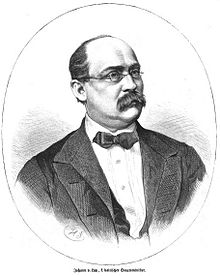Johann von Lutz
Johann Lutz , from 1866 Ritter von Lutz , from 1883 Baron von Lutz , (born December 4, 1826 in Münnerstadt , † September 3, 1890 in Niederpöcking ) was a Bavarian politician .
family
His parents were the elementary school and music teacher Joseph Lutz (1801–1879) and his wife Magdalena, née Schedel (1809–1862). She was a daughter of the country doctor Karl Schedel from Hammelburg.
In 1853 Lutz married Caroline Reuss (1828–1865), a daughter of the rent clerk Lorenz Reuss and Rosina Bechert, in Sommershausen. The couple had a son and daughter, including:
- Ernst (February 22, 1859 - July 19, 1921) ∞ Julie Petzold (* July 11, 1863 - October 11, 1950)
After her death, he married Anna von Schmidt-Osting (1838-1884) in Munich in 1867, a daughter of the doctor Adolph von Schmidt-Osting and Amalie von Habermann. With her he had two sons, including:
- Adolf Joseph Oskar (born January 11, 1868 - † April 11, 1952)
- ∞ Countess Marie von Bothmer (* September 14, 1874; † November 24, 1913)
- ∞ Maria von Cölln (* May 6, 1878; † July 6, 1974)
After his second wife died, Lutz married Margareta Fretzscher (1845–1924) widowed Riedinger, a daughter of the surgeon Georg Fretzscher and Magdalena Langenmayr, in Munich in 1887. He had no other children with his last wife.
Life
Lutz attended high school in his hometown and then studied law at the University of Würzburg from 1843 to 1848 . As a Bavarian delegate, he participated in the drafting of the General German Commercial Code . In 1866 he was awarded the Knight's Cross of the Order of Merit of the Bavarian Crown . Associated with this was the elevation to the personal nobility and he was allowed to call himself Ritter von Lutz after his entry in the nobility register .
In 1867 he became Minister of Justice and in 1869 Minister of Education and as such ran the Bavarian Kulturkampf to enforce state supremacy over the church. After Bismarck's forced resignation in 1880, Chairman of the Council of Ministers Pfretzschner , Lutz took over his position, which he held until his death. It was the only time that the chairman of the Council of Ministers was not also the Minister for Foreign Affairs .
Lutz made the German Progressive Party , which was only founded in 1863, the pillar of the government and tried to preserve the position of the king by consistently resisting letting him become “a mere typewriter in the hands of the responsible ministers”. Lutz was nevertheless significantly involved in the overthrow of King Ludwig II . In March 1886 he commissioned Chief Medical Officer Bernhard von Gudden , a specialist in brain anatomy, to prepare an opinion on Ludwig's mental state.
Lutz spoke out in favor of a comprehensive revision of the Bavarian state church law in the sense of a separation of state and church. In 1889 he defended for the last time in a major ecclesiastical political debate before the Chamber of Deputies the state church position that he had consistently represented for decades. His successor in the chairmanship of the Bavarian Council of Ministers was Friedrich Krafft von Crailsheim in 1890 .
Lutz was raised to hereditary nobility on August 21, 1880 and to baron on December 28, 1883 (matriculation on February 24, 1884).
Individual evidence
- ^ German biography: Lutz, Johann Freiherr von (Bavarian staff nobility 1866, hereditary nobility 1880, baron 1884)
literature
- Theodor Bitterauf: Johann Freiherr von Lutz . In: Allgemeine Deutsche Biographie (ADB). Volume 55, Duncker & Humblot, Leipzig 1910, pp. 555-558.
- Walter Grasser: Johann Freiherr von Lutz. A political biography. Munich 1967.
- Erika Bosl: Lutz, Johann von. In: Karl Bosl (ed.): Bosls Bavarian biography. Pustet, Regensburg 1983, ISBN 3-7917-0792-2 , p. 499 ( digitized version ).
- Walter Grasser: Johann Freiherr von Lutz. In: New German Biography (NDB). Volume 15, Duncker & Humblot, Berlin 1987, ISBN 3-428-00196-6 , pp. 568-570 ( digitized version ).
- Karl Möckl : Johann (Freiherr von) Lutz (1826–1890). In: Franconian pictures of life. New series of CVs from Franconia. (= Publications of the Society for Franconian History . Series VII A, Vol. 14). Society for Franconian History , Würzburg 1991, ISBN 3-7686-9114-4 , pp. 211–242.
| personal data | |
|---|---|
| SURNAME | Lutz, Johann von |
| ALTERNATIVE NAMES | Lutz, Johann Freiherr von (from 1884); Lutz, Johann Ritter von; Lutz, Johann (until 1866) |
| BRIEF DESCRIPTION | Bavarian politician and minister |
| DATE OF BIRTH | December 4, 1826 |
| PLACE OF BIRTH | Münnerstadt |
| DATE OF DEATH | September 3, 1890 |
| Place of death | Niederpöcking |

